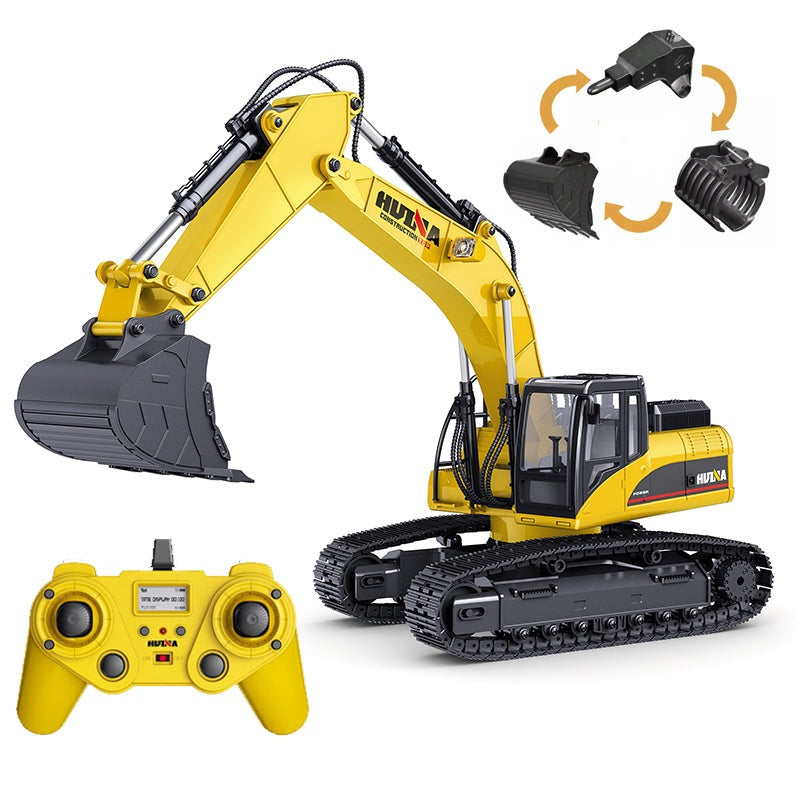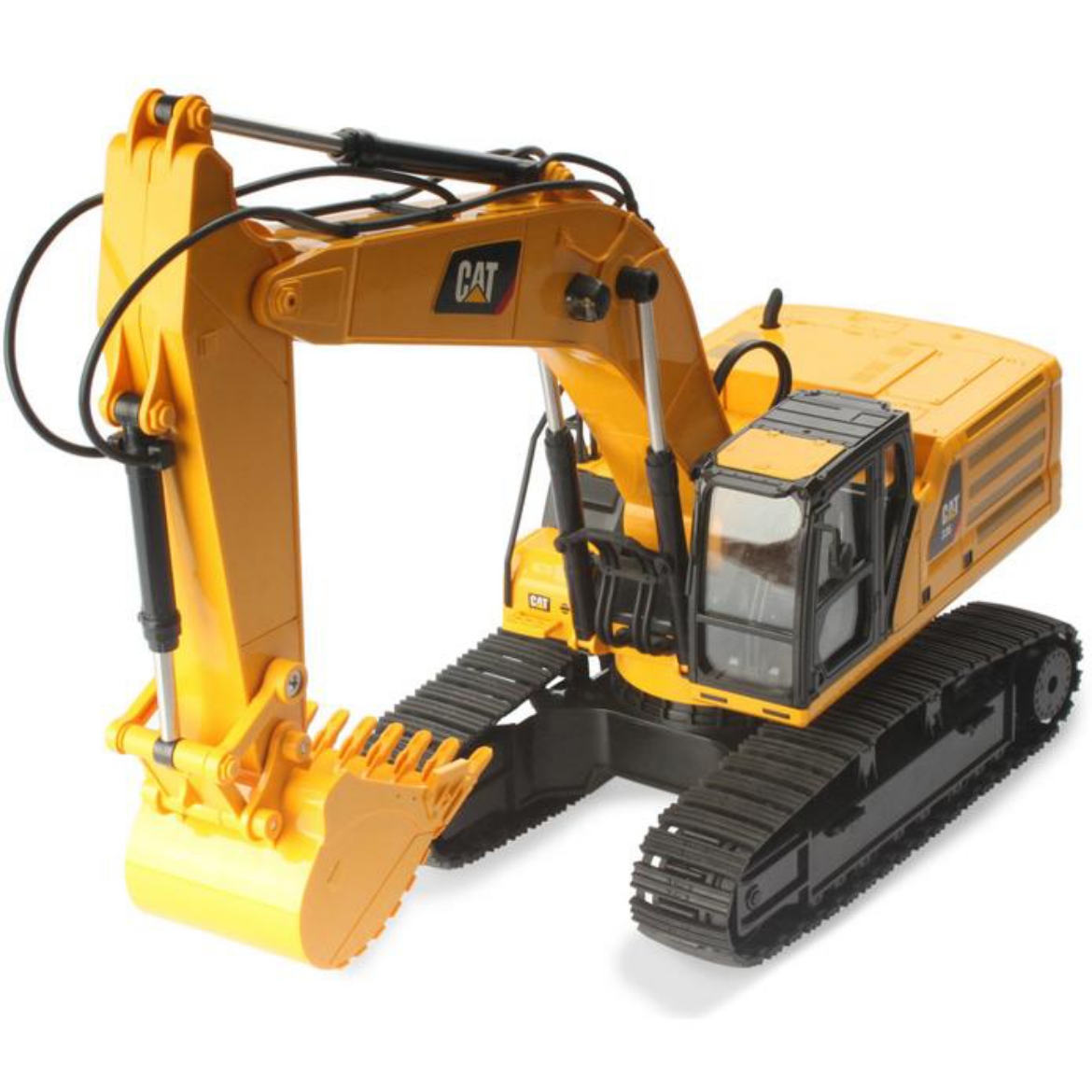10 Common Mistakes to Avoid When Operating a rc excavator
Discover the Relevance of Excavator in Modern Building Projects
Excavators are necessary devices in contemporary construction projects. Their versatility allows them to execute a wide variety of jobs, from digging and grading to demolition and site prep work. Advanced features, such as hydraulic add-ons and GPS, enhance their abilities and performance on work sites. As the industry develops, the value of excavators grows even more. Comprehending their duty can expose understandings into the future of construction methods. What lies in advance for these devices?
The Versatility of Excavators in Different Projects
Excavators are commonly connected with large-scale building projects, their versatility allows them to be made use of in a large variety of applications, from domestic landscape design to energy upkeep. In city settings, excavators can browse tight areas to dig foundations for homes or set up water drainage systems. Their capacity to execute delicate tasks makes them ideal for landscape design tasks, where they can dig deep into for fish ponds or plant trees. In enhancement, excavators play a necessary role in utility upkeep, effectively excavating trenches for pipes or cable televisions without interfering with surrounding areas. In agricultural applications, they assist in land cleaning and soil prep work. Additionally, their adaptability enables them to be geared up with different attachments, improving their capability across various jobs. This multifaceted nature of excavators not only simplifies different building procedures however also demonstrates their important function in modern-day infrastructure advancement and upkeep.
Key Attributes and Kinds Of Excavators
The conversation on crucial features and kinds of excavators highlights the important characteristics that make these devices very useful in building. Various excavator kinds, each made for certain jobs, demonstrate their adaptability and effectiveness across different applications. rc excavator. Recognizing these features and classifications is crucial for enhancing their usage in contemporary building projects
Excavator Types Introduction
Excavators play an essential function in contemporary construction, offering flexibility and effectiveness across numerous jobs. These heavy equipment devices been available in several types, each customized for particular applications. One of the most usual kinds consist of crawler excavators, recognized for their security on uneven terrain, and rolled excavators, which offer greater movement on smooth surfaces. Tiny excavators are favored for limited spaces and small projects, while long-reach excavators are developed for deep digging. In addition, there are customized excavators, such as hydraulic excavators, which boost power and accuracy. Each kind features unique capacities, making them important for tasks varying from digging and grading to demolition and material handling. Understanding these variants enables building and construction experts to pick the right excavator for their task needs.
Key Includes Explained
Understanding the vital attributes of excavators enhances their efficient application in construction projects. Excavators are characterized by their effective hydraulic systems, which supply the necessary pressure for excavating, lifting, and moving products. Their articulated arms allow for a wide variety of movement, promoting accurate operations in restricted areas. Additionally, the selection of accessories, such as buckets, grapples, and augers, expands their versatility to meet different job needs. The dimension and weight of excavators also contribute to their stability and maneuverability on different terrains. Moreover, improvements in innovation have actually led to the assimilation of general practitioner and automation, improving precision and efficiency in excavation jobs. These features collectively place excavators as vital devices in modern-day building and construction.
Applications in Building
Transforming construction sites, excavators play a crucial role throughout different applications, ranging from property building projects to large facilities developments. These flexible devices are outfitted for tasks such as digging structures, trenching for energies, and website grading. Different types of excavators, including crawler, rolled, and mini excavators, offer specific benefits customized to the project demands. Spider excavators succeed in harsh surfaces, while rolled excavators offer flexibility on paved surface areas. Tiny excavators are excellent for constrained rooms, making them prominent in city setups. The efficiency and power of excavators significantly quicken building processes, guaranteeing prompt project completion. Their versatility even more enhances their value, permitting construction groups to deal with a diverse array of difficulties effectively.
Enhancing Effectiveness and Efficiency on Work Sites
Making best use of efficiency and efficiency on job sites is a vital goal in contemporary building and construction. Excavators play a pivotal role in achieving this goal by enhancing various jobs. Their capacity to do several functions-- such as training, grading, and excavating-- decreases the requirement for additional tools, thus conserving time and resources.Moreover, excavators boost operations by enabling faster completion of projects. With innovative features like hydraulic attachments and GPS modern technology, they can execute specific procedures that minimize errors and remodel. This precision not just boosts the top quality of job however also maximizes material usage, adding to set you back savings.The versatility of excavators enables them to adapt to various site conditions, ensuring that jobs progress smoothly despite difficulties. By incorporating excavators right into building procedures, teams can considerably enhance their total performance, resulting in timely job completion and enhanced profitability.
Safety And Security Advantages of Utilizing Excavators
Excavators considerably boost safety and security on construction sites via improved driver visibility and minimized manual work threats. By offering operators with a clear view of their surroundings, excavators aid to stop crashes and injuries. In addition, the equipment reduces the requirement for employees to engage in unsafe hands-on jobs, additionally promoting a much safer workplace.
Enhanced Driver Exposure
Building and construction websites can be disorderly and filled with prospective dangers, enhanced driver exposure plays an essential function in making certain security when using excavators. Modern excavators are developed with large, unblocked windows and tactically placed mirrors, allowing drivers to preserve a clear sight of their environments (rc excavator). blog here This improved presence is crucial for identifying pedestrians, various other equipment, and different obstacles, substantially lowering the risk of accidents. Furthermore, lots of excavators incorporate sophisticated innovation, such as sensors and cams, to supply operators with additional perspectives, additionally boosting awareness. The ability see it here to see even more plainly not only aids in effective operation however additionally fosters a much safer job atmosphere, making it simpler for drivers to navigate complex building websites without endangering safety criteria
Decreased Guidebook Labor Threats
When manual work is decreased with using excavators, many safety and security benefits emerge, substantially enhancing the health of construction employees. Excavators decrease the physical stress connected with heavy lifting and repeated jobs, efficiently decreasing the risk of bone and joint injuries. By automating processes such as digging, grading, and relocating products, they permit employees to maintain a more secure distance from potential dangers. Additionally, excavators are furnished with innovative safety and security attributes, such as rollover defense systems and improved operator functional designs, which better protect workers on website. The outcome is a substantial decrease in work environment mishaps and injuries, bring about enhanced performance and spirits amongst building groups. Eventually, the fostering of excavators adds to a more secure and much more reliable building environment.
Excavators in Earthmoving and Site Preparation
In contemporary building and construction, a significant part of earthmoving and site prep work jobs counts on the efficiency and flexibility of excavators. These equipments are made to take care of various soil kinds and surface, making them indispensable for rating, excavating, and trenching activities. Their hydraulic arms can be equipped with different add-ons, such as augers and containers, allowing drivers to personalize their technique based on certain task requirements.Excavators succeed at moving large quantities of earth rapidly and successfully, which speeds up the overall construction timeline. They can browse limited rooms and challenging websites where typical equipment may battle, enhancing performance. Furthermore, the precision of excavators guarantees that website prep work adheres to strict specs, minimizing the danger of mistakes that could bring about pricey rework.
The Duty of Excavators in Demolition Tasks
Excavators play a crucial duty in demolition tasks, as they possess the power and agility required to take down structures effectively. Furnished with numerous add-ons such as hydraulic breakers, shears, and grapples, these equipments can adapt to various demolition demands, whether for small buildings or huge commercial websites. Their versatility allows operators to deal with complex jobs while maintaining security and precision.In enhancement to their demolition capabilities, excavators help with debris removal, ensuring that job sites stay orderly website link and safe. By breaking down frameworks into convenient pieces, they permit structured cleaning and recycling of materials, aligning with contemporary sustainability efforts.Moreover, excavators can access limited rooms and browse unequal surface, making them vital in city demolition projects. In general, their durable design and multifunctionality make excavators a crucial possession in the demolition stage of construction, contributing substantially to project timelines and efficiency.


Future Patterns in Excavator Modern Technology and Usage
As the building and construction market progresses, improvements in excavator modern technology are positioned to change their usage and effectiveness considerably. One significant pattern is the assimilation of automation and expert system, allowing excavators to operate with marginal human treatment. This change will enhance accuracy in jobs such as grading and trenching, lowering human mistake and boosting productivity.Additionally, the rise of electric and hybrid excavators is forming a more sustainable construction setting, decreasing carbon discharges and fuel prices. Improved telematics systems are also arising, making it possible for real-time surveillance of machine efficiency and maintenance requirements, which can cause far better operational efficiency and longer tools lifespan.Moreover, developments in accessory modern technology are broadening the flexibility of excavators, allowing them to execute a broader range of jobs. The combination of these patterns demonstrates a future where excavators are smarter, greener, and more adaptable, eventually improving construction project characteristics.
Regularly Asked Concerns
How Do Excavators Compare to Other Building Machinery?
Excavators, identified by their adaptability and power, master excavating and earthmoving compared to various other machinery. Their capability to do different tasks, including lifting and demolition, makes them essential in building projects, boosting total effectiveness.

What Is the Typical Life-span of an Excavator?
The ordinary life-span of an excavator commonly varies from 7,000 to 10,000 operating hours, relying on upkeep, usage conditions, and version. Appropriate treatment can expand this life-span, making certain peak efficiency throughout its operational years.
How Are Excavators Maintained for Optimum Performance?
Excavators call for routine upkeep for peak performance, including routine examinations, liquid checks, filter replacements, and prompt repair work. Carrying out a preventive upkeep schedule aids extend their life-span and guarantees reliable procedure in numerous building and construction atmospheres.
What Are the Costs Related To Purchasing an excavator vs. renting?
The expenses related to renting out versus buying an excavator differ substantially. Renting offers reduced upfront expenditures but can build up in time, while acquiring calls for a significant initial investment, yet offers lasting cost savings and asset possession benefits.
What Training Is Required to Run an Excavator?
Operating an excavator calls for specialized training, generally consisting of safety procedures, equipment operation strategies, and ecological understanding. Accreditation programs typically mandate useful experience, allowing operators to deal with various jobs successfully while guaranteeing conformity with industry regulations. The most common types consist of crawler excavators, understood for their security on unequal surface, and wheeled excavators, which provide higher wheelchair on paved surfaces. Mini excavators are preferred for small-scale projects and tight spaces, while long-reach excavators are made for deep digging. Additionally, there are specialized excavators, such as hydraulic excavators, which improve power and accuracy. Different kinds of excavators, consisting of spider, rolled, and mini excavators, offer details advantages tailored to the project demands. Spider excavators stand out in rough terrains, while rolled excavators offer wheelchair on paved surface areas.